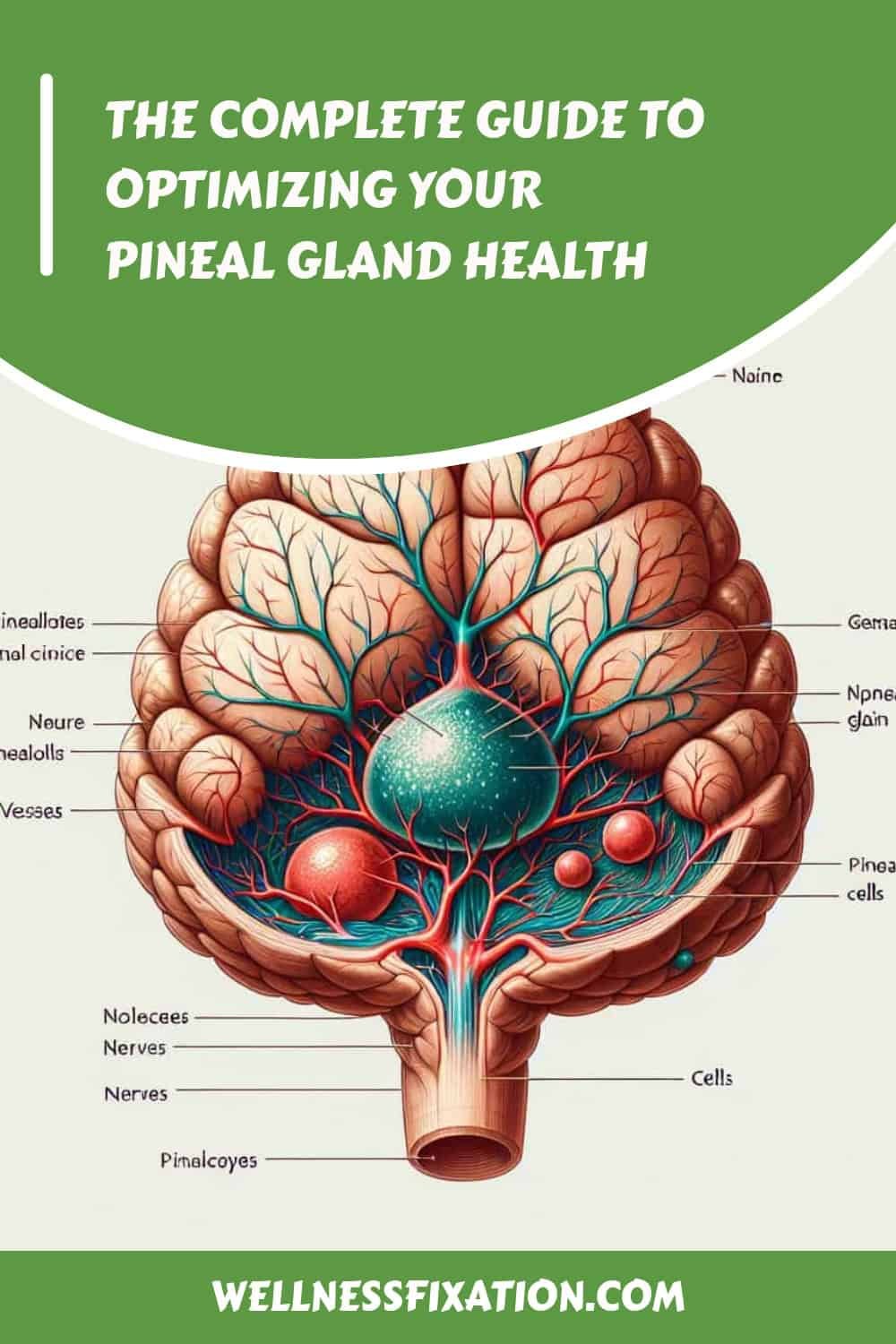The Complete Guide to Optimizing Your Pineal Gland Health

Wellness Fixation is reader supported, meaning I may earn a small commission if you purchase something through my links at no extra cost to you. Thanks for your support! Learn more
Key Takeaways
- Sunlight exposure is essential for pineal gland health, helping regulate sleep patterns and mood.
- A diet rich in antioxidants supports pineal function and reduces harmful calcification.
- Regular meditation and mindfulness practices can enhance the gland’s function and overall well-being.
- Avoiding fluoride and processed foods is crucial for preventing pineal gland calcification.
- Engaging in safe sun gazing can potentially activate the pineal gland and improve cognitive abilities.
The Complete Guide to Optimizing Your Pineal Gland Health
Introduction to Pineal Gland Health
Our bodies are intricate systems, each part playing a crucial role in maintaining balance and harmony. Among these, the pineal gland, though tiny, holds a significant position. Nestled deep within the brain, it is often referred to as the “third eye,” not just because of its central location, but due to its vital role in regulating sleep and circadian rhythms through melatonin production.
Click Below to Hear The Pineal Gland Health Podcast
Understanding the pineal gland’s function can open doors to improving our overall health. This guide will explore how to enhance your pineal gland health through natural methods, lifestyle changes, and dietary adjustments. Let’s dive in and unravel the mysteries of this fascinating gland.
Functions and Importance of the Pineal Gland
The pineal gland’s primary function is the production of melatonin, a hormone that influences sleep patterns and circadian rhythms. This hormone is released in response to darkness, signaling to the body that it’s time to rest. Therefore, it plays a pivotal role in maintaining our sleep-wake cycle.
Besides regulating sleep, the pineal gland also impacts mood and cognitive function. By synchronizing with the light-dark cycle, it helps our bodies adapt to environmental changes, ensuring we remain alert and energized during the day and restful at night. This balance is crucial for our mental and physical health.
Moreover, the pineal gland is believed to be a gateway to spiritual and intuitive awareness. Many cultures associate it with enlightenment and inner vision, attributing its importance to both physical and metaphysical realms. For those interested in exploring this further, morning meditation practices can be a beneficial starting point.
“The pineal gland is a highly tuned appendage to the brain that processes information from the Universe by synchronizing with countless frequencies.”
Signs of an Imbalanced Pineal Gland
Recognizing an imbalance in the pineal gland can be challenging but not impossible. Some common signs include disrupted sleep patterns, mood swings, and a general feeling of fatigue. These symptoms often arise from insufficient melatonin production, affecting your body’s natural rhythms.
Furthermore, an imbalanced pineal gland may lead to seasonal affective disorder or even contribute to depression. This is because the gland’s ability to produce melatonin directly impacts our mood and emotional stability. Therefore, maintaining its health is crucial for overall well-being.
Impact of Lifestyle on Pineal Gland Health
“Your pineal gland’s function and ability to release melatonin can be affected by conditions such as pineal gland tumors, injuries, and calcification.”
Our daily habits significantly influence the health of the pineal gland. Factors such as exposure to natural light, dietary choices, and stress levels all play a role in its functionality. A lifestyle that supports the gland’s natural processes can enhance its ability to regulate hormones and maintain balance. Engaging in practices like meditation for sleep and anxiety can be beneficial for maintaining a stress-free environment conducive to pineal gland health.
For instance, consistent exposure to sunlight helps the pineal gland produce adequate melatonin, aligning our sleep cycles with natural light patterns. Conversely, excessive screen time and artificial lighting can disrupt this cycle, leading to imbalances. To counteract these effects, consider incorporating morning meditation into your routine.
Incorporating a balanced diet and regular exercise can also support pineal gland health. Nutrient-rich foods and physical activity promote overall well-being, indirectly benefiting the gland’s function.
Nutritional Choices for Pineal Gland Support
Diet plays a vital role in maintaining a healthy pineal gland. Foods rich in antioxidants, such as fruits and vegetables, help combat oxidative stress and reduce the risk of calcification. This, in turn, ensures the gland remains functional and efficient.
Importance of Sleep and Circadian Rhythms
Sleep is essential for overall health, and the pineal gland is at the heart of this process. By regulating melatonin production, it helps establish a natural sleep-wake cycle, crucial for rest and recovery. Disruptions to this cycle can lead to various health issues, including fatigue and mood disorders.
- Ensure exposure to natural light during the day.
- Limit screen time before bedtime to reduce blue light exposure.
- Maintain a consistent sleep schedule, even on weekends.
By following these steps, you can support your pineal gland in maintaining a healthy circadian rhythm, promoting better sleep and overall well-being.
Natural Methods to Enhance Pineal Gland Function
There are several natural methods to boost the health of your pineal gland. These include lifestyle changes, dietary adjustments, and mindfulness practices. Each approach offers unique benefits, contributing to the gland’s optimal function.
In the following sections, we’ll explore these methods in detail, providing actionable steps to enhance your pineal gland health naturally.
Benefits of Sunlight Exposure
Sunlight is a natural trigger for the pineal gland to produce melatonin, a hormone essential for regulating sleep and mood. When we expose ourselves to sunlight, especially in the morning, it helps reset our internal clock, aligning our sleep-wake cycle with the natural day-night rhythm. This synchronization is crucial for maintaining a healthy circadian rhythm.
Beyond its role in sleep regulation, sunlight exposure also boosts serotonin levels, a neurotransmitter that improves mood and promotes feelings of well-being. Therefore, spending time outdoors each day can significantly enhance both your mental and physical health.
Incorporating Meditation and Mindfulness
Meditation and mindfulness are powerful tools for enhancing pineal gland function. By practicing these techniques regularly, you can reduce stress, improve focus, and increase your awareness of the present moment. This heightened state of awareness can positively influence the gland’s ability to regulate melatonin production.
Start by setting aside a few minutes each day for meditation. Find a quiet space, sit comfortably, and focus on your breath. As thoughts arise, acknowledge them without judgment and gently bring your attention back to your breath. Over time, you’ll notice an improvement in your mental clarity and emotional balance.
Dietary Adjustments for Optimal Gland Health
What we eat directly impacts the health of our pineal gland. A diet rich in antioxidants can protect the gland from oxidative stress and reduce the risk of calcification. Incorporate foods like berries, leafy greens, nuts, and seeds into your meals to boost your antioxidant intake. For additional support, consider exploring fruit and vegetable supplements to enhance your diet.
Additionally, consider adding foods high in omega-3 fatty acids, such as fish and flaxseeds, which support brain health and can enhance the gland’s function. Staying hydrated is equally important, so drink plenty of water throughout the day to keep your body and brain well-nourished.
Potential Pitfalls and Substances to Avoid
While there are many ways to support pineal gland health, certain substances can be detrimental. Being aware of these pitfalls and making conscious choices to avoid them can prevent harm and promote better gland function.
Understanding Fluoride’s Impact
Fluoride, commonly found in tap water and dental products, has been linked to pineal gland calcification. This process can hinder the gland’s ability to produce melatonin, disrupting sleep patterns and overall health. To minimize fluoride exposure, consider using a water filter that removes fluoride and opt for fluoride-free toothpaste. For additional relaxation techniques, explore stress relief meditation to support your overall well-being.
Dangers of Processed Foods
Processed foods often contain additives and preservatives that can negatively affect pineal gland health. These substances may contribute to calcification and inflammation, impairing the gland’s function. To protect your pineal gland, aim to eat whole, unprocessed foods whenever possible.
Besides that, processed foods are usually high in sugar and unhealthy fats, which can lead to weight gain and other health issues. By choosing fresh fruits, vegetables, and lean proteins, you can support your overall health and enhance the function of your pineal gland.
Special Techniques for Pineal Activation
Activating the pineal gland can lead to improved cognitive abilities and heightened spiritual awareness. There are specific techniques that can help stimulate this vital gland, promoting a sense of clarity and well-being.
In the following sections, we’ll explore some of these techniques, providing guidance on how to safely and effectively activate your pineal gland.
Practicing Sun Gazing Safely
Sun gazing is a practice that involves looking at the sun during safe hours, typically at sunrise or sunset, when UV rays are minimal. This practice is believed to stimulate the pineal gland, enhancing its function and promoting mental clarity. However, it’s essential to approach sun gazing with caution to avoid eye damage.
Start by spending just a few seconds looking at the sun, gradually increasing the duration over time. Always listen to your body and stop if you experience any discomfort. With regular practice, you may notice improvements in your mood, energy levels, and overall well-being.
Engaging in Visualization and Imagery
Visualization and imagery exercises can also activate the pineal gland. By imagining vivid scenes and focusing on positive outcomes, you can stimulate the gland and improve its function. This practice not only enhances creativity but also promotes relaxation and stress reduction.
Try incorporating visualization into your daily routine. Close your eyes and picture a peaceful scene, such as a beach or forest. Engage all your senses, imagining the sounds, smells, and textures of the environment. With practice, you’ll find this exercise to be a powerful tool for mental and emotional well-being.
Pineal Gland, Spirituality, and the Third Eye Connection
The pineal gland has intrigued many for centuries, often associated with spirituality and the concept of the “third eye.” This tiny gland, located at the center of the brain, is believed to be a bridge between the physical and spiritual worlds. Many cultures and spiritual traditions view the pineal gland as a symbol of enlightenment and higher consciousness. For those interested in exploring this further, practices like healing meditation can be a way to nurture this connection.
Understanding this connection can enhance our appreciation for the pineal gland’s role in both physical and metaphysical health. By exploring its spiritual significance, we can gain insight into how this gland influences our perception and awareness.
Historical Significance and Cultural Beliefs
Throughout history, the pineal gland has been revered in various cultures. Ancient Egyptians depicted it as the Eye of Horus, symbolizing protection and royal power. Similarly, in Hinduism, the pineal gland is linked to the third eye chakra, representing intuition and insight. For those interested in enhancing their spiritual practice, healing meditation can be a powerful tool.
These cultural beliefs highlight the pineal gland’s perceived role in spiritual and intuitive development. By tapping into this ancient wisdom, we can explore ways to enhance our spiritual growth and understanding through the health of our pineal gland.
Practical Applications in Modern Practices
Today, many people incorporate practices like meditation, yoga, and mindfulness to stimulate the pineal gland and enhance their spiritual awareness. These practices can help quiet the mind, reduce stress, and promote a sense of inner peace, allowing us to connect with our deeper selves.
By integrating these techniques into our daily lives, we can support the health of our pineal gland and unlock its potential for spiritual and personal growth. Consider incorporating healing meditation as part of your routine to enhance this journey.
Conclusion and Practical Steps Forward
Optimizing pineal gland health involves a holistic approach, combining lifestyle changes, dietary adjustments, and mindfulness practices. By understanding the gland’s functions and significance, we can take proactive steps to support its health and enhance our overall well-being.
Summary of Key Practices for Gland Health
- Expose yourself to natural sunlight daily to regulate melatonin production.
- Incorporate antioxidant-rich foods into your diet to prevent calcification.
- Practice meditation and mindfulness to reduce stress and enhance focus.
- Avoid fluoride and processed foods to protect the gland from damage.
- Engage in visualization exercises to stimulate the pineal gland.
By following these practices, you can promote the health of your pineal gland and enjoy the benefits of improved sleep, mood, and spiritual awareness. Consider incorporating stress relief meditation into your routine for enhanced benefits.
Remember, consistency is key. Regularly incorporating these habits into your routine will yield the best results over time. Stay committed to your pineal gland health journey and reap the rewards of a balanced and harmonious life.
Crafting a Daily Routine for Pineal Support
Creating a daily routine that supports your pineal gland can be simple and effective. Start your day with a few minutes of sunlight exposure, followed by a healthy breakfast rich in antioxidants. Set aside time for meditation or mindfulness, even if it’s just a few minutes.
Throughout the day, stay hydrated and choose whole, unprocessed foods to nourish your body. In the evening, limit screen time and create a relaxing bedtime routine to promote restful sleep. By incorporating these habits, you can support your pineal gland and enhance your overall well-being.
Frequently Asked Questions (FAQ)
Many people have questions about the pineal gland and how to optimize its health. For those interested in natural methods, 20-minute meditation can be a beneficial practice. Here are some common inquiries and their answers.
How can I tell if my pineal gland is functioning well?
A healthy pineal gland is typically indicated by regular sleep patterns, stable mood, and a general sense of well-being. If you’re experiencing disrupted sleep, mood swings, or persistent fatigue, it may be worth exploring ways to support your pineal gland, such as trying 5-minute morning meditation.
“Your pineal gland’s function and ability to release melatonin can be affected by conditions such as pineal gland tumors, injuries, and calcification.”
If you suspect an imbalance, consider consulting with a healthcare professional for further evaluation and guidance.
What are the best supplements for Pineal Gland Health?
While a balanced diet is the best way to support your pineal gland, certain supplements can provide additional benefits. Melatonin supplements can help regulate sleep patterns, especially for those with disrupted circadian rhythms. Omega-3 fatty acids, found in fish oil supplements, support brain health and can enhance the gland’s function.
Additionally, antioxidants like vitamin C and E can protect the gland from oxidative stress and calcification. Always consult with a healthcare professional before starting any new supplement regimen to ensure it’s appropriate for your individual needs.
By understanding and caring for your pineal gland, you can unlock its potential for better health and spiritual growth. Embrace these practices and enjoy the journey toward a more balanced and fulfilling life.
Maintaining a healthy lifestyle can significantly impact your overall well-being. Incorporating regular meditation practices, such as 5-minute morning meditation, can help reduce stress and improve mental clarity. Additionally, a balanced diet rich in fruits and vegetables supports physical health. By making these small changes, you can enhance your quality of life and foster a more positive outlook.











